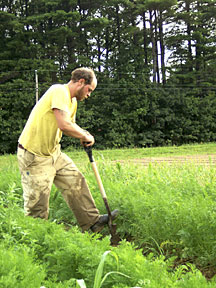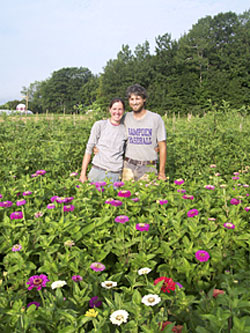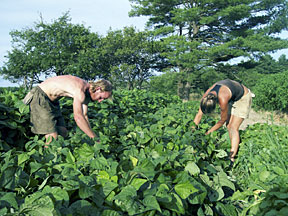 |
| Chris Cavendish was the first to take up George Christopher’s offer of an “incubator farm” on Christopher’s land in Bowdoinham. Cavendish has been so successful there that he has expanded from 4 to 12 acres under cultivation. Photo by Manon Whittlesey, Morphee, Bowdoinham. |
George Christopher was once described to me as “an enigma figure with a vision.” The figure prefers to remain enigmatic except to the people he knows, but his vision is being played out each season on 1,000 acres of land in Bowdoinham, Maine, a small but strategically located community on the outskirts of Brunswick and Topsham. Three farmers or farming couples are leasing acreage from what Christopher terms his “Farm Incubator Program” – and according to all three, the situation is working.
Fishbowl Farm
Fishbowl Farm is a familiar name to MOFGA members. Chris Cavendish got his start in farming at MOFGA’s Common Ground Education Center in 2004 as the farmer-in-residence. When his journeyperson time was up, Cavendish contacted George Christopher. “I remember the drive down Brown’s Point Road – I drove up one day after market in the fall. It was still warm, and had just rained. I crossed the one-lane bridge and saw fields on my right – right on the water. That was a big plus.”
Proximity to Merrymeeting Bay, proximity to thriving farmers’ markets, and a flat, fertile, stoneless field snagged Cavendish like the fish on his logo. “It took me less than a week to say, ‘Yeah, I want to be here.’” He quickly set up a greenhouse (he now has three) and hired some help. Within two years his farm has expanded from 4 to 12 acres of mixed vegetables, root crops, extended season greens and tomatoes, and, recently, organic strawberries. Fishbowl Farm serves both summer and winter CSA members, three farmers’ markets and limited wholesale accounts. The incubator that George Christopher pictured, according to Cavendish, is working for Fishbowl Farm.
Six River Farm
Nate Drummond and Gabrielle Gosselin are the type of healthy young farmers who make their customers envy the “farm life” and line up for some of “that beautiful food.” They work hard, they work together, and even in their first year of farming on Christopher’s land, they “exceeded expectations both in sales and production.” Despite a few first season setbacks (including a greenhouse blowing apart on Patriot’s Day, 2007 – after which “we just tilled in the seedlings, put the tunnel house back up, and stuck tomatoes in,” Gosselin says), by April 2008 they were gung-ho for another farming season. In 2007, the two worked the farm alone; in 2008, they expanded their acreage and hired some help. “Direct market vegetable farming,” Drummond says, “is a personality fit for me. I like interacting with the customers, and pushing to extend the seasons.”
 |
| Nate Drummond and Gabrielle Gosselin’s Six River Farm is near Cavendish’s Fishbowl Farm on flat, stone-free, riverside land. Shared equipment and expertise have helped them tremendously. Photo by Manon Whittlesey, Morphee, Bowdoinham. |
Six River Farm (named after the six rivers emptying into Merrymeeting Bay) is on the same flats as Fishbowl Farm, and they share the packing shed. Chris Cavendish says the two farms have been able to learn from each other, and Nate says that Cavendish’s experience on the land helped them immensely in their first season.
In terms of being in Christopher’s incubator, the two feel the situation has been good. They’ve made use of his equipment and that of another neighboring farmer – a bonus that allowed them to invest very specifically and wisely in their own limited equipment. Gosselin says they don’t see Christopher often, but when they do, he is “very helpful – hands off, but always supportive.”
Life Force Farm
The third farm on George Christopher’s land isn’t on the famously fertile flats with the elaborate infrastructure, but is on the old Carlton Cross Road farmstead across from Christopher’s own farmhouse. Life Force Farm came to Bowdoinham with a different sort of market plan and criteria than Six River or Fishbowl Farm. Life Force Farm is a 75-member CSA (Community Supported Agriculture farm) now in its first year, practicing intensive cropping in small plots rather than in fields. Ben Dearnsley owns and organizes the CSA, and his co-farmer is Kate Stoner. On the day I visit, Stoner’s five-year-old son, Flynn, supervises. Stoner points out that Carlson Cross Road, set back from the fast-traveling White Road, has been a much better fit for Flynn than any of George Christopher’s other properties. “Here the house is close enough to the fields that Flynn can go where he chooses,” Stoner says. “If we were down by the Bay, the fields would be too far from the house and he’d be miserable.” Dearnsley also enjoys the farm’s situation on the land; the small plots literally encircle the farmstead like a fairy ring.
The two had to put a lot of work into improving the house and clearing debris from the old barn site to get the farmstead to an acceptable level for the first CSA pick-up. “There were times,” Dearnsley says, “[when] we weren’t sure how we were going to get it all cleared in time, but we got to see a lot of the history of the place amidst the rubble …”
 |
| Ben Dearnsley and Kate Stoner have a 75-member CSA based at the Carlton Cross Road farm of George Christopher. They grow produce in small, intensive plots surrounding the farmhouse where they live. Photo by Manon Whittlesey, Morphee, Bowdoinham. |
The CSA shareholders at Life Force Farm definitely reap the benefits of such hard work. Their produce is early, it is abundant, and it glows. Their colorful swiss chard wows people from across the room, and their basil and broccoli play tug-o-war with the nose. A few Indian Runner ducks provide background music. Dearnsley and Stoner would eventually like to see all their shareholders come directly from Bowdoinham, but they are happy that, even in their first year, they have a waiting list for shares.
How the Past Grew Into the Present
George Christopher never intended to own 1,000 acres and five farmhouses. In fact, he never intended to own more than 5 acres. “I was at the town auction to buy a woodstove, and I asked the old-timer who sold it to me if he knew of any land for sale. He took me to his farm and wouldn’t sell just 5 acres. So I bought the whole farm.
“It’s the situations you couldn’t know about ahead of time but find yourself in and working within – those are the ones that lead to survival.” Christopher Farm raised (and still raises) fiber sheep and cattle, but the long-term cropping plan speaks to a different definition of sustainable agriculture – a sustainable population of farmers as well as a large, preserved land base in Bowdoinham.
“When I pass,” Christopher says, “all of the land goes to Maine Farmland Trust.” He is as frank as a grandfather explaining physics: “The divorce rate in this country is 50 percent. That means, no matter how strong the desire to keep the farm, if it is not protected, within two generations it will be split or lost.” Christopher is an ever-hopeful sort though, and sees that better solutions can be had.
And Unto the Future
The town of Bowdoinham, while still apparently rural, is slowly, quietly filling with private homes. Christopher’s road went from six houses in 1964 to 104 today. The development pressure is often modest and aesthetically pleasing, even with green-minded homes hidden among trees. The forecast, though, is that in 10 years, every available building lot will be built upon. This does not bode well for the town’s farmers – and Christopher can see the writing on the wall: Animal farming has a limited timeframe in Bowdoinham.
“Vegetables don’t make noise,” Christopher says. “They don’t get out, they don’t smell, they don’t bother the neighbors one bit. It’s a boon to have squash growing next door – cattle are not considered the same.”
Beyond transitioning to vegetable agriculture, Christopher hopes to see his land develop into a farm in the style of that at Intervale, Vermont. He’d like to have older tenants mentoring the younger; to see a mechanic-mentor as part of the program; to have families living in the farmhouses; to have a community of independent farmers thriving in Bowdoinham. To some extent, he says, it’s already happening: Many young, organic farmers have settled within 25 miles of Christopher, and more continue to do so. “It’s a much broader phenomenon than just here.”
I asked Christopher what he thought would be the key to survival of small farms in his area. ”It is a matter of finding something that just clicks. The farms without uniqueness – those are the ones I’ve seen perish, one by one.”
Christopher has seen 40 years of farming in Bowdoinham, but he speaks of a recent farm tour with great hope and enthusiasm: “We had 70 young people out here for a MOFGA apprentice/journeyperson workshop in July,” he says, “and what a thing to see. Chris talked as he went, and the line was so long, one knew the rear could not hear a thing. Nate sat himself down on the wellhead and used that as his podium.
“There is great hope when we see this crop of young farmers,” he says, adding that he is eager to see more farmers on his land.
You can call George Christopher between 8 p.m. and 9 p.m. at 666-5942.
